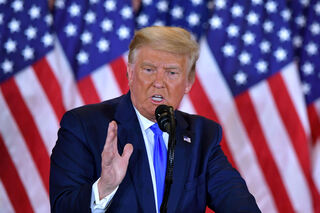Trust
Rebuilding Trust in Our Institutions
What psychology can teach us about how to help people trust again.
Posted December 4, 2020 Reviewed by Devon Frye
Both leading up to and immediately following the much-anticipated 2020 U.S. presidential election, one word kept coming up over and over again in the media and in real-life conversation: trust. Many anxious Democratic voters worried before the election about whether they could trust polls predicting a Biden win. Indeed, polls in 2016 had projected Hillary Clinton as the winner, and this obviously did not pan out.
Immediately following the election, a broad contingency of Republicans, including Donald Trump himself, claimed that there was widespread election fraud and that the results were not to be trusted. This has wreaked havoc on the smooth transition of power that usually defines our democracy.

As we reflected on this historic occasion and the upheaval that followed, we found ourselves thinking more deeply about this concept of trust. For one thing, it is not specific to this election. Public trust in government, for example, has been in precipitous decline for decades, dropping from around 70 percent in 1978 to around 50 percent now. This is also not just an American phenomenon but exists worldwide. Which led us to a series of questions: What do we know about the psychology of trust? Why does it exist? What purpose does it serve? And what can be done to restore it?
It should not come as a complete surprise that the main benefit of trust is a social one. Trust allows us to cooperate with others and, most importantly, to collaborate. This ability to collaborate and work with others, rather than to do everything ourselves, makes us a more efficient society and allows us to achieve considerably more using our collective knowledge and abilities than we ever could if we all operated independently. It may not be a complete exaggeration to say that trust is in fact a fundamental element in the success of the human species writ large. If anything, we can certainly posit that trust is extremely important to the fundamental functioning of human society.
Some intriguing recent neuroscience research has shown us more specifically where trust might sit in the brain. In one experiment, people were assigned to various conditions, one in which they were told they were playing an economic investment game with a friend they trusted; one in which they told they were playing with a computer; and one in which they were told they were playing with a stranger. In all three instances, subjects were, in reality, playing with a computer that had equal odds in all cases of cooperating with or betraying the subject.
As expected, people were more likely to want to go in on an investment together with a trusted friend rather than with a stranger or a computer. What was more interesting here was that subjects’ brain activity was also tracked during this activity, and in the trusted friend condition, there was much higher activation in both the ventral striatum and the medial prefrontal cortex. The ventral striatum is associated with the brain’s reward pathway, and the media prefrontal cortex is associated with decision-making. This suggests that it is actually rewarding when we feel we can trust and in addition, it can be a vital element in how we make important decisions.
If trust is essential to societal functioning and it has also been eroded in recent years, what can possibly be done to rebuild it? This is a more difficult question to answer, especially since most of the research and advice on rebuilding trust has to do with individual relationships rather than institutional trust. Nonetheless, there are some broad concepts and ideas that should be taken into account by our new leadership here in the U.S. and by leaders everywhere.
First of all, trust can be rebuilt through actions but is less likely to be restored through words alone. Of course, politicians can still make speeches, but the best way to rebuild trust is to show results. The more scientific and quantifiable the results, the better.
Second, politicians and other leaders should take the time to collect targeted feedback in areas where trust is low. When people are in a state of distrust, they often feel like their voices have been silenced, and having an opportunity to speak up can be therapeutic.
Finally, clear communication has to be prioritized above everything else. The importance of this cannot be overstated. Many Americans lost faith in the coronavirus pandemic response process when government officials were unclear about the need to wear masks and then failed to explain why there was a shift in thinking. Even if recommendations change over time, public officials must take the time to explain why rather than just reversing a recommendation and hoping everyone will follow suit.
As the U.S. tries to move forward with a political process mired with doubt, it is time we think more clearly about how to heal the now deeply-rooted distrust of our system that has taken hold in recent years. We still have a lot to learn, especially about how institutional trust works, but in the meantime, there are a number of actions we can take to heal a system that has been seriously undermined.


